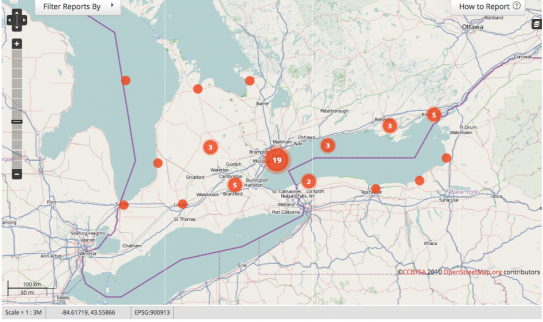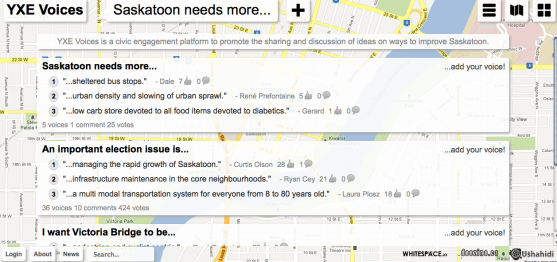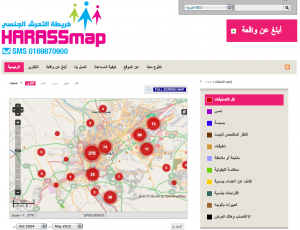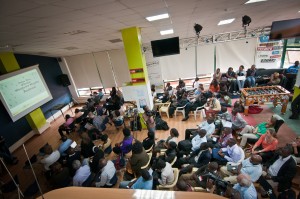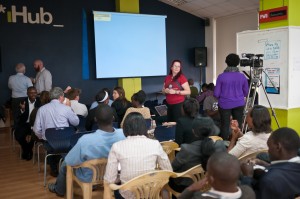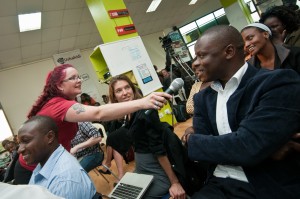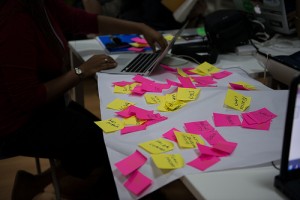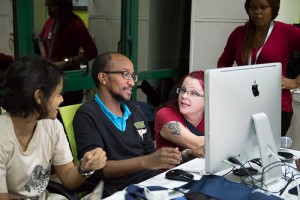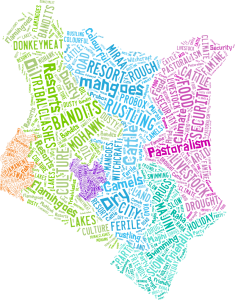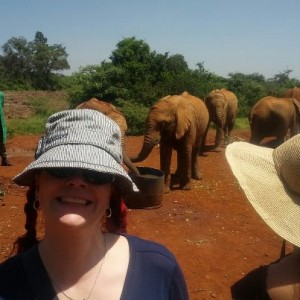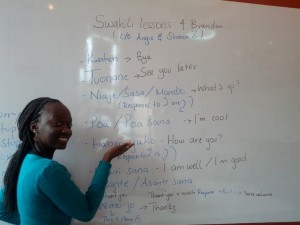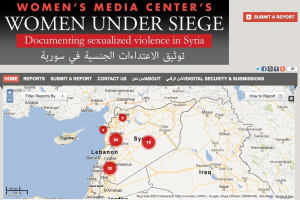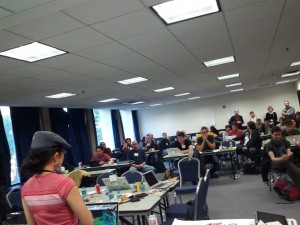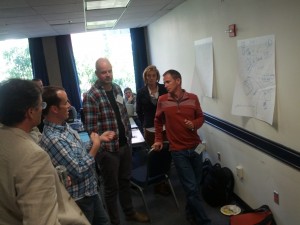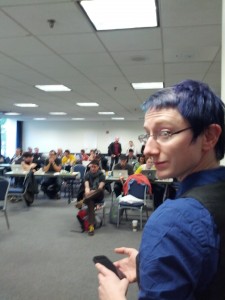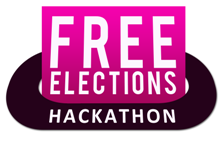[Written and Cross-posted from the Ushahidi blog]
Uchaguzi is You! is our mantra. We are always on and always in edit mode. We are managed in a team driven engine that is decidedly non-linear. Everyone works with integrity and takes our Code of Collaboration to heart.
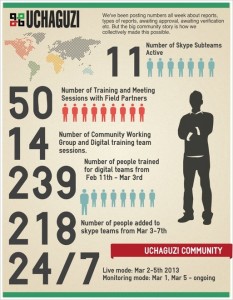
From the community, partners, team and friends, Uchaguzi has been a massive project of collaboration and change. In that spirit, we wanted to share some overall highlights. We are global and 24/7 with over half of the people involved based in Kenya. While our cultures and languages may be different, Kenyans and people from around the world joined together in a common cause: GIVE VOICE.
The Uchaguzi team have been head down mapping since last Friday, March 1, 2013. We are collectively exhausted, but driven. Each person, each edit, and each suggestion has been discussed in a team zone. Often, we’ve been so busy doing that even writing about what we are doing instead of doing, seems, well, wrong. But, we want to honour the community by sharing some of their story. Thank goodness that our Analysis and SMS teams have been blogging some on the sitroom blog. Their posts give a great view into the ever-changing project. We have been inside the skype chat rooms trying to take their large volume of inputs (SMS) and give them outputs (reports to analyze).
“Everyone pulled together and went where was most useful. Even though they had signed up to perform one certain task, no one complained etc about doing a different one. This just goes to emphasise what a bunch of multi skilled volunteers there are.” Jus MacKinnon
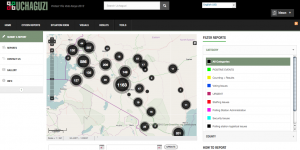
The connection between the offline and the online is core to the project. Daudi Were, Project Lead, has held tireless field meetings and training sessions with partners who were on site for election monitoring at polling stations. These people remain deployed in the field. In addition, have trained over 200 people mainly local with some global support for timezone shifting. Our mapper friends from Abuja (Nigerian mappers), NYU GIS class lead by Dr. Colette Mazzucelli, Humanitarian OpenStreetMap and some Standby Task Force folks have joined the mostly local Ihub Nairobi community as well as those trained from our partners Creco, Peacenet and Sodnet (who are all across the country). We also have a strong contingent from Translators without Borders to help translate and folks from MercyCorp to help verify reports. There are many new people, which is beautiful and hard. We are seeing the future leaders in this field. And, we are overwhelmed by the gift of each person’s time and energy to this project.
“But for me the long term impact of this deployment will be an evolution in the area of connecting humans to their governance process from a position of power”- Om.
More about what the Digital teams are doing:
The Community participants come from all walks of life. Here are some of the key curves that they have navigated with amazing tenacity, spirit and dedication:
MAKERS: learning and building global collaboration skills in real-time
BUILDERS: creating a common language while combine all areas of knowledge and disciplines. This is truly an interdisciplinary group that works with many cultures and languages
EDIT MODE: change the process, software and research in real-time. There are few things sacred on this project. Our wiki has all the process documents which get edited frequently. We advise of changes via skype because email is too slow. Bugs and some features are fixed and tested in real-time. Plus, the embedded real-time analysis and research team is providing guidance, sensemaking and quality control feedback. Data is not static in this type of project, so we in turn, need to be in EDIT MODE.
See our wiki for how we are editing. : )
The number of A-ha moments across the board are brilliant. Not only are people rising up to learn and do, it is changing our software development as well as changing best practices for deployment, research and documentation. Thank you, take a bow.
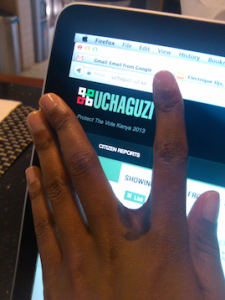
Photo by Wambui Kamiru
SOME HUMAN STATS:
We’ve been posting numbers all week about reports, types of reports, awaiting approval, awaiting verification etc. But, the big community story is how we collectively made this possible:
Number of Skype Sub-teams active:
10 (SMS, Media Monitoring, Geolocation, Translation, Reports, Verification, Analysis & Research, QA, Tech and Communications), 11 if you count the Ushahidi internal team chat.
Number of Training sessions with Field Partners:
50 plus meetings between January 4 and March 4th. (There were many in 2012 too.)
Number of Community Working Group and Digital training team meetups:
14 (There were also some side group team sessions. (e.g. Analysis))
Number of people trained for digital teams from February 11 – Sunday, March 3, 2013: Over 239 trained on and before
Number of people added from March 3 – 6th (including some real-time trained folks): 218
Number of days that the Deployment was 24/7 around the globe and locally: Saturday, March 2 (9am EAT) – Tuesday, March 3 (3:00 pm EST)
Number of days of monitoring: Friday, March 1st plus Tuesday, March 3 – continuing
Where are people from: Kenya, Cameroon, Libya, Botswana, Nigeria, Ireland, UK, Slovenia, US, Canada, Brazil, New Zealand, Spain, South Korea.
Some quick team updates for you:
SMS
The SMS team wins for the most revisions to their process to meet the real-time needs. The good news is that team trained and handed off each process. Due to high volumes, we use many people from other teams. (See more about their team below).
MEDIA MONITORING
The MM wins for being the team that we steal participants. Honestly, with the volume of SMS, we needed more folks in SMS and Reports to help. The Media Monitoring team has been slightly skeleton. We made a mandate at the beginning of the year to only post citizen voices to the map. This means SMS, Twitter and Facebook posts. We aren’t recycling news stories. But, with the sparse coverage there are fewer of these types of reports. We look for the most urgent ones.
TRANSLATION
The Translation team is a combination of trained professionals at Translators without Borders and digital participants from Kenya and beyond. The transition to being deeply inside a software deployment had a steep learning curve. But, it was fantastic to see reports quickly translated. Being fast paced on global teams is hard enough, try doing it in a few languages like these folks.
GEOLOCATION
The Geolocation team has been one of our rocks in this process. They have been doubling up on reviewing content and keeping the rest of us in line for process adherence. Plus, maps are hot. Our friends from Humanitarian OpenStreetMap arrived Tuesday and Wednesday just as we were burning out. The amount of nerd cross-training in Team Geo has been fantastic. Simply put, there will be more geonerdia in .ke if these folks have anything to say about the future.
VERIFICATION
Verification is the ROCK of the project. The folks in the field and in our verification skype rooms are fast. Stellar fast. Often, they are working on verifying information before the rest of us can get the reports to geo or translation. At first it was confusing, but once we got into the flow, it was amazing. Please look at all the reports with “verified”. You will see notes about the action taken. This is not the first deployment with embedded verification. But, their often seamless link between offline and online teams will be a best-practice strategy for other deployments to model and remix. A taste of how we worked:
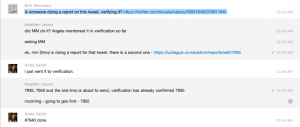
TECH:
The technical teams included some core Ushahidi staff and trusted developers. Code was pushed frequently. See github for that action.
They also worked closely with the Analysis team to create the Visuals and Results pages.
You’ll note that we hacked that into the Uchaguzi platform.
ANALYSIS, Research and QA
The Analysis and Research team includes designers, developers, data hackers, researchers and policy folks. They collaborated to create Visuals and make sense of the data. Plus, their frequent reports helped all of us know the wide-angle lens.
In the middle of our live project, we created a sub-team for Quality Assurance. This team includes developers, researchers and others. The goal is to dig into the data and problem-solve. Doing root cause analysis can help with training and fixing stuff. This is one of the most important changes to keeping the project on the rails.
Communications:
We’ve got a dedicated group of folks trying to tell the story while we map. Check out their amazing snapshots on the SitRoom.
Some More thoughts from the community:
“I want to profusely thank the “UshaGuzi” team for their vision to create a best-practices solution for such pressing needs. Ushahidi and spinoffs are a huge step in the right direction. I also want to highlight how this process was different from other deployments in the respect that a communications feedback loop was closed and I think the effect will be electric.”
Receiving SMS and mapping it: done often
Receiving SMS and sending a response: done rarely
Creating a means to react to ongoing communications with an individual: New Paradigm Thinking
School and childcare pulled me out of the windows longer than I anticipated; it was always incredible to return and see hundreds of messages gone by. But for me the long term impact of this deployment will be an evolution in the area of connecting humans to their governance process from a position of power. I look forward to refining all of our procedures to prepare for the inevitable next election. Having developers involved with the live deployment was a pleasure.
I’ll include the ubiquitous appreciation for the actual people who joined up and got involved and whose dogged determination provided valuable understanding. SMS Team deserves more than that though. For problem solving on-the-fly, being enthusiastic about the larger goal while doing so much to tackle the minute by minute reality of providing a more clear ‘people’s voice’ to the world. Al Jazeera is just the first of many places where this map will show up and I’m very grateful to have had this opportunity.”
With deep respect,
Om
Asante tutaonana siku moja.
…………………………………………………………………………………….
The Kenyan team was very happy to have the Pan African contingent individual (Botswana), Yemi and Egghead Odewale (Nigeria) and Jean Brice (Cameroon) fly all the way to volunteer and spend time with us when we really needed it.
They were rockstars at helping out and jumping between their teams and assisting with SMS. It has been a great week of learning and camaraderie with the local community. Friendships made stronger around Africa and the US.
Dr. Susan Benesch not only worked with the Umati team but also assisted with the SMS backlog.




